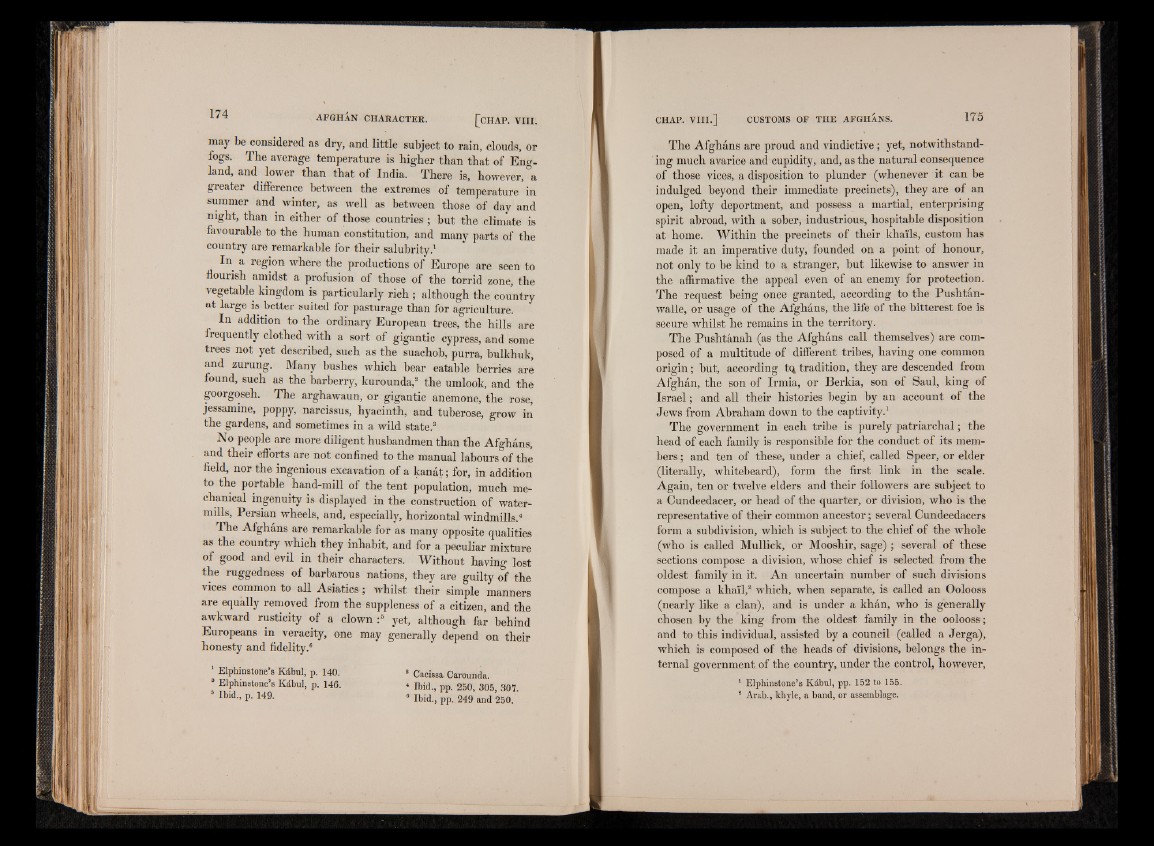
may be considered as dry, and little subject to rain, clouds, or
fogs. The average temperature is higher than that of England,
and lower than that of India. There is, however, a
greater difference between the extremes of temperature in
summer and winter, as well as between those of day and
night, than in either of those countries; but the climate is
favourable to the human constitution, and many parts of the
country are remarkable for their salubrity.1
In a region where the productions of Europe are seen to
flourish amidst a profusion of those of the torrid zone, the
vegetable kingdom is particularly rich ; although the country
at large is better suited for pasturage than for agriculture.
In addition to the ordinary European trees, the hills are
frequently clothed with a sort of gigantic cypress, and some
trees not yet described, such as the suachob, purra, bulkhuk,
and zurung. Many bushes which bear eatable berries are
found, such as the barberry, kurounda,2 the umlook, and the
goorgoseh. The arghawaun, or gigantic anemone, the rose,
jessamine, poppy, narcissus, hyacinth, and tuberose, grow in
the gardens, and sometimes in a wild state.3
No people are more diligent husbandmen than the Afghans,
and their efforts are not confined to the manual labours of the
field, nor the ingenious excavation of a kanat; for, in addition
to the portable hand-mill of the tent population, much mechanical
ingenuity is displayed in the construction of watermills,
Persian wheels, and, especially, horizontal windmills.4
The Afghans are remarkable for as many opposite qualities
as the country which they inhabit, and for a peculiar mixture
of good and evil in their characters. Without having lost
the ruggedness of barbarous nations, they are guilty of the
vices common to all Asiatics; whilst their simple manners
are equally removed from the suppleness of a citizen, and the
awkward rusticity of a clown :6 yet, although far behind
Europeans in veracity, one may generally depend on their
honesty and fidelity.6
1 Elphinstone’s Kdbul, p. 140.
8 Elphinstone’s Kdbul, p. 146.
5 Ibid., p. 149.
1 Cacissa Carounda.
4 Ibid., pp. 250, 305, 307.
6 Ibid., pp. 249 and 250.
The Afghans are proud and vindictive; yet, notwithstanding
much avarice and cupidity, and, as the natural consequence
of those vices, a disposition to plunder (whenever it can be
indulged beyond their immediate precincts), they are of an
open, lofty deportment, and possess a martial, enterprising
spirit abroad, with a sober, industrious, hospitable disposition
at home. Within the precincts of their khai'ls, custom has
made it an imperative duty, founded on a point of honour,
not only to be kind to a stranger, but likewise to answer in
the affirmative, the appeal even of an enemy for protection.
The request being once granted, according to the Pushtan-
walle, or usage of the Afghans, the life of the bitterest foe is
secure whilst he remains in the territory.
The Pushtanah (as the Afghans call themselves) are composed
of a multitude of different tribes, having one common
origin; but, according tq tradition, they are descended from
Afghan, the son of Irmia, or Berkia, son of Saul, king of
Israel; and all their histories begin by an account of the
Jews from Abraham down to the captivity.1
The government in each tribe is purely patriarchal; the
head of each family is responsible for the conduct of its members
; and ten of these, under a chief, called Speer, or elder
(literally, whitebeard), form the first link in the scale.
Again, ten or twelve elders and their followers are subject to
a Cundeedacer, or head of the quarter, or division, who is the
representative of their common ancestor; several Cundeedacers
form a subdivision, which is subject to the chief of the whole
(who is called Mullick, or Mooshir, sage); several of these
sections compose a division, whose chief is selected from the
oldest family in it. An uncertain number of such divisions
compose a khail,2 which, when separate, is called an Oolooss
(nearly like a clan), and is under a khan, who is generally
chosen by the king from the oldest family in the oolooss;
and to this individual, assisted by a council (called a Jerga),
which is composed of the heads of divisions, belongs the internal
government of the country, under the control, however,
1 Elphinstone’s Kabul, pp. 152 to 155.
8 Arab., khyle, a band, or assemblage.